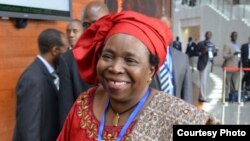The 23rd Ordinary Summit of the African Union officially opened in Sipopo, Malabo in Equatorial Guinea, Thursday with the African Union Commission chairperson Dr. Nkosazana Dlamini-Zuma calling on African leaders to stick to their pledge to work towards silencing guns on the continent by 2020.
Dr. Dlamini-Zuma said without peace and stability, Africa will not be able to develop its agriculture, create jobs and food security if conflicts continue to rage, a prospect she said should not be entertained.
“Agriculture is critical in our industrialization efforts,” she said. “Agro-processing of our agricultural products are not only critical to food security, but also to increased earnings, job creation and our broader goal of industrialization.”
“For our agriculture and our environments to flourish, we need conditions of peace and stability, and for our people not to be under threat from armed gangs, terrorists and human and arms traffickers,” added Dr. Dlamini-Zuma.
“Silencing the guns in every corner of Africa therefore must remain a priority.”
Commitment
African leaders are gathered in Malabo to recommit themselves to the comprehensive Africa Agriculture Development Programme (CAADP), which they adopted a decade ago to eradicate hunger and rural poverty, to grow dynamic agricultural markets within and between African countries and regions and to become a strategic player in agricultural science and technology, among other issues.
The CAADP also aims to make Africa a net exporter of agricultural and food products.
To achieve this, the AUC chairperson said, Africa needs to do more and faster.
This includes increased public and private investments and implementation of irrigation projects, targeting women who toil the fields, access to land and agricultural inputs “so they can move from being farm workers to being food producers”.
Youth
Of concern to Dr. Dlamini-Zuma is the average age of an African farmer, which she put at 50 years in some regions.
“This cannot be in a young continent as our own,” she said, adding it was a reflection that Africa’s agriculture is still backward and therefore failing to attract the youth.
“A practical priority is therefore to modernize and mechanize, to use science and technology and once and for all banish the hand hoe to museums, instead of it being the symbol of women in Africa,” said Dlamini-Zuma.
She said the continent’s vision and plan for the next 50 years, dubbed “Agenda 2063; The Africa We Want” would be adopted at the next African Union Summit.
“We are already in year one of our fifty-year journey and we are shifting gear towards working on the practical programs in all our Agenda 2063 priority areas and make the change we want to see irreversible,” Dlamini-Zuma said.
The summit is running under the theme "Agriculture and Food Security" and 2014 is Africa's year of promoting and improving agriculture.
Conflict
UN Secretary General Ban Ki Moon said he was concerned by conflicts in some countries like South Sudan and the Central African Republic, saying they are affecting Africa's progress in attaining total peace, security and the desire for increased production, industrialization and other issues.
He said only peace and stability can help Africa move towards eradicating hunger and poverty and reaching the Millennium Development Goals.
Climate change
Mr. Ban said climate change is one of Africa's major challenges, adding leaders on the continent need to raise their voice on the issue.
He invited them to a summit he's hosting in New York in September to discuss climate change and its impact mostly on the developing world.
“It is sad that Africa being the worst affected by climate change does not have the resources to mitigate He said it was sad that Africa being the worst affected by climate change, does not have the resources to mitigate its effects,” he said.
“So I’m urging African leaders to raise your voice on this issue so you can be heard.”
He said in the past year across Africa, there was stability, economic growth and continued progress except for South Sudan, Somalia, the Central African Republic and a few other spots.
“Wherever there was crisis, the African Union and regional partners took the lead in forging solutions,” said Mr. Ban.
He said the United Nations was proud to be a key partner in Africa’s transformation.
“We are committed to your goal of an integrated, prosperous and peaceful Africa, driven by its own citizens and representing a dynamic force in the global arena,” said Mr. Ban.
Egypt
The new president of Egypt, Abdel Fattah al-Sisi, was welcomed at the summit together with other new recently elected African leaders.
The Egyptian president pledged to work with the AU and all African countries in addressing problems facing his country and the whole continent.
Palestinian leader Mahmoud Abbas gave a solidarity message as did the Spanish Prime Minister Mariano Rajoy.
Experts attending a session with the African leaders after the official opening ceremony Thursday under the theme: “Transforming Africa’s Agriculture for Shared Prosperity Through Harnessing Opportunities for inclusive growth and sustainable development” called for African leaders to put more money into agriculture to avert food shortages in the future.
“Commitment and action on the ground is what we need and not just words and declarations,” one expert told the African leaders in the open session. “Please give us the leadership. Africa can feed itself.”




